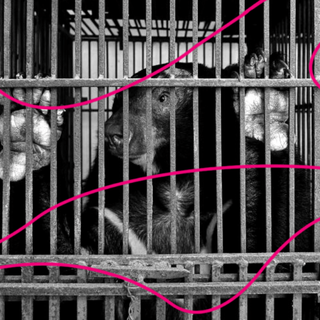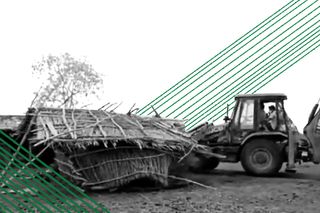
Tribal Community in Madhya Pradesh Evicted From Homes Without Official Notice
The state forest department bulldozed houses despite an ongoing stay on any evictions during the pandemic, according to a report.

The Madhya Pradesh forest department on Saturday reportedly bulldozed several dwellings of the Bhil and Barela Adivasi communities in the Khandwa district.
The eviction has rendered more than 40 families, who have been living there since 1963, homeless, according to a NewsClick report.
“Over 200 people belonging to the forces stormed our area — without any warning or any information… We were threatened and abused by the department. Our houses have been destroyed and we have nothing but the clothes we were wearing,” Ramlal Buda, one of the people who was forced to evict, told NewsClick.
Community members alleged that the officials destroyed their fields and crops, thereby cutting off their source of food and livelihood. Buda was among some people who were allegedly attacked by the officials. Officials then detained four community members, including a 12-year-old child, and members of the Jagrit Adivasi Dalit Sangathan (JADS), a people’s organization based in Madhya Pradesh.
Activists and community members claim that the eviction was in violation of the Forest Rights Act (FRA). Formally known as The Scheduled Tribes and Other Traditional Forest Dwellers (Recognition of Forest Rights) Act, 2006, the Act is a key piece of legislation that was meant to recognize the rights of forest-dwelling communities to forest land and resources — it would have undone “historical injustice” to Schedules Tribes and other traditional forest dwellers, the Ministry of Tribal Affairs has noted.
The implementation of the FRA, however, remains abysmal. The FRA mandates a transparent monitoring system for disputes or claims over forest land. In the present case, the forest officials reportedly carried out the eviction without prior warning, leaving community members without shelter. This is more concerning during the pandemic.
The present eviction comes amid recent and growing disputes over the legitimacy of claims to forest land between forest dwellers and the judiciary and law enforcement. The dispute perches on the ability to prove ownership of a particular land using title documents and other established procedures — documents that tribal groups often don’t possess. As of February 2021 this year, government officials have rejected 45% of all claims to tribal land.
Related on The Swaddle:
SC Orders Removal of Over 10,000 Slum Dwellings From Haryana’s Aravali Forest Land
The current incident also echoes the lacking recognition of forest rights of tribal groups. The present eviction is part of a decades-long conflict between the Bhil and Barela communities in the Khandwa district and forest officials. People are called “encroachers” and are routinely detained, violently evicted, beaten, and extorted.
“The Barelas are the latest to settle here… Some [Bhils] have been here since Aurangzeb’s time. Foresters, officially or unofficially, have settled them and every year would demand a fine to not evict them,” Madhuri Krishnaswamy, from JADS, told The Hindu in 2019. As a result, locals live in constant fear, food insecurity, and are vulnerable to labor exploitation due to the absence of land titles.
Under section 4(5) of the FRA, people are protected from eviction till the documents and claims are under observation. Notably, the community has filed for land rights legally, but the forest department reportedly grazed their dwellings despite the legal framework.
“The evictions being carried out are in complete violation of the Forest Rights Act as well as the Jabalpur court’s decision staying all the evictions amidst the pandemic. Moreover, the families have been fighting the battle for their land rights legally,” activist Nitin Varghese told NewsClick.
Recent Supreme Court judgments have also come down heavily on people who claimed forest land. In February 2019, the court ordered the eviction of an estimated 1 million tribals who claimed ownership of forest land.
In other cases, governments acquire forest land for large-scale development projects through coercion or force, ignoring the locals’ consent. One such project in Madhya Pradesh this year is the Chutka Nuclear Power Project, which received clearances despite not obtaining the community’s consent beforehand– in violation of the FRA.
The trend is notable across different states. “Thousands of claims filed by tribals in both Andhra and Telangana have been opposed tooth and nail by the forest department personnel during the adjudication process before the committees set up under the Forest Rights Act,” Counterview noted.
“…forest department is digging long deep trenches restraining the tribals from exercising their right to individual land cultivation as well as community rights.”
The Community Forest Rights-Learning and Advocacy group (CFR-LA) in a 2016 citizen’s report identified Madhya Pradesh as a “laggard” state in its implementation of Community Forest Resource (CFR) rights, which the report cites as the most important set of rights. CFR rights are one of 14 rights recognized under the FRA, which allow communities “to use, manage and govern forests within the traditional boundaries of villages.”
Rohitha Naraharisetty is a Senior Associate Editor at The Swaddle. She writes about the intersection of gender, caste, social movements, and pop culture. She can be found on Instagram at @rohitha_97 or on Twitter at @romimacaronii.
Related


India Has No Urban Drought Policy, Leaving Cities Unprepared, Vulnerable
